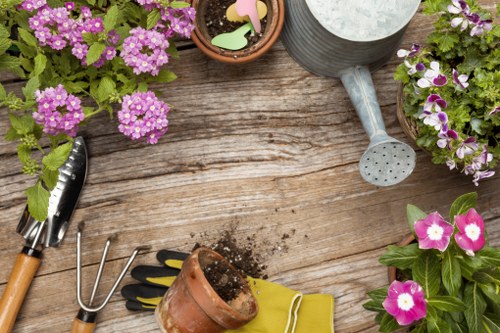Comprehensive Guide to Garden Maintenance in Swiss Cottage

Maintaining a beautiful garden in Swiss Cottage requires dedication, knowledge, and the right set of tools. Whether you're a seasoned gardener or a beginner, understanding the unique climate and soil conditions of Swiss Cottage can significantly enhance the health and aesthetics of your garden.
Swiss Cottage, known for its vibrant community and lush green spaces, offers a conducive environment for a variety of plants. However, successful garden maintenance here involves specific strategies tailored to the local environment.
In this article, we'll explore essential garden maintenance tips, seasonal care routines, and expert advice to help you achieve a thriving garden in Swiss Cottage.
Understanding the Swiss Cottage Climate

The climate in Swiss Cottage is characterized by mild temperatures, moderate rainfall, and a mix of sunny and cloudy days throughout the year. This climate supports a diverse range of plant species, but it also presents certain challenges that gardeners need to address.
Understanding the local climate is the first step in effective garden maintenance. It helps in selecting the right plants, scheduling garden activities, and implementing appropriate care techniques.
Here are some key climatic factors to consider:
- Temperature: Swiss Cottage experiences mild summers and cool winters, with occasional frosts.
- Rainfall: Moderate rainfall is spread evenly throughout the year, reducing the need for extensive irrigation.
- Sunlight: The area enjoys a balance of sunny and shaded areas, allowing for a variety of plant growth.
Soil Preparation and Health

Healthy soil is the foundation of a thriving garden. In Swiss Cottage, the soil composition can vary, but it generally favors loamy and well-draining types. Proper soil preparation involves testing, amending, and maintaining soil health.
Start by conducting a soil test to determine its pH level and nutrient content. This will guide you in making necessary amendments to optimize plant growth.
Key steps for soil preparation include:
- Testing: Use a soil test kit to assess pH and nutrient levels.
- Amending: Add organic matter like compost or manure to improve soil structure and fertility.
- Mulching: Apply mulch to retain moisture, suppress weeds, and regulate soil temperature.
Plant Selection and Placement

Choosing the right plants is crucial for garden success. Swiss Cottage's climate supports a wide range of flora, but selecting plants that thrive locally will reduce maintenance efforts and enhance garden beauty.
Consider the following when selecting plants:
- Hardiness: Opt for plants that are hardy in the Swiss Cottage climate.
- Sunlight Requirements: Match plants to areas of your garden based on their sunlight needs.
- Water Needs: Group plants with similar water requirements together to simplify irrigation.
Additionally, thoughtful placement can create visually appealing garden layouts and promote healthy plant growth.
Seasonal Garden Maintenance

Maintaining a garden year-round in Swiss Cottage involves adjusting your care routines according to the seasons. Each season presents unique challenges and opportunities for garden upkeep.
Spring
Spring is a critical time for preparing your garden after the winter months. Tasks include pruning, planting new additions, and fertilizing the soil to encourage fresh growth.
Summer
During summer, focus on watering, weeding, and pest control. Ensuring plants receive adequate moisture and protection from pests will keep your garden thriving.
Autumn
Autumn is ideal for harvesting, composting, and preparing plants for the colder months. It's also a great time to plant bulbs for spring blooms.
Winter
Winter maintenance involves protecting plants from frost, pruning dormant growth, and planning for the upcoming gardening season.
Tools and Equipment for Efficient Maintenance
Having the right tools makes garden maintenance more manageable and efficient. In Swiss Cottage, where gardens can range from small urban spaces to larger suburban plots, equipping yourself with essential tools is vital.
Essential gardening tools include:
- Pruning Shears: For trimming and shaping plants.
- Garden Fork: Useful for turning and aerating soil.
- Watering Can or Hose: Ensures plants receive adequate moisture.
- Gloves: Protect your hands while working in the garden.
- Loppers: For cutting thicker branches.
Investing in high-quality tools not only improves efficiency but also enhances the overall gardening experience.
Pest and Disease Management
Pests and diseases can wreak havoc on your garden if not managed properly. Swiss Cottage's varied climate can attract a range of garden pests, making proactive management essential.
Effective pest control strategies include:
- Regular Monitoring: Inspect plants regularly for signs of pests or disease.
- Natural Remedies: Use organic solutions like neem oil or insecticidal soaps to manage infestations.
- Companion Planting: Grow plants that naturally repel pests alongside vulnerable species.
- Proper Sanitation: Remove diseased plants and debris to prevent the spread of issues.
Maintaining a healthy garden environment reduces the likelihood of severe pest and disease problems.
Watering Techniques and Irrigation
Proper watering is fundamental to garden maintenance. In Swiss Cottage, the moderate rainfall can complement your irrigation efforts, but it's important to monitor and adjust watering based on specific plant needs and seasonal changes.
Key watering practices include:
- Deep Watering: Encourage deep root growth by watering thoroughly rather than frequently.
- Morning Schedule: Watering in the early morning reduces evaporation and fungal risks.
- Drip Irrigation: An efficient method that delivers water directly to the plant roots.
- Mulching: Helps retain soil moisture and reduces the need for frequent watering.
Implementing these techniques ensures that your plants receive the right amount of water without waste.
Pruning and Trimming
Regular pruning and trimming are essential for maintaining plant health and encouraging growth. In Swiss Cottage gardens, where plants can thrive year-round, timely pruning helps manage plant size and shape.
Pruning benefits include:
- Promotes Air Circulation: Reduces the risk of disease by allowing better airflow through the canopy.
- Enhances Aesthetics: Keeps plants looking neat and well-shaped.
- Stimulates Growth: Encourages new shoots and flowering by removing old or dead branches.
Different plants require specific pruning techniques, so it's important to research or consult with a gardening expert for best results.
Fertilizing for Optimal Growth
Fertilizing provides essential nutrients that promote healthy plant growth. In Swiss Cottage's soil, supplementing with the right fertilizers can make a significant difference in your garden's vitality.
Consider the following when fertilizing:
- Soil Test Results: Use soil test data to choose fertilizers that address specific nutrient deficiencies.
- Organic vs. Synthetic: Decide between organic options like compost and synthetic fertilizers based on your gardening preferences.
- Application Timing: Apply fertilizers during the growing season for maximum effectiveness.
Proper fertilization supports robust plant health and vibrant blooms throughout the year.
Lawn Care and Maintenance
A well-maintained lawn is a cornerstone of any beautiful garden. In Swiss Cottage, lawn care involves regular mowing, aeration, and addressing issues like weeds and pests.
Essential lawn care practices include:
- Mowing: Keep the grass at an optimal height to promote thick, healthy growth.
- Aeration: Improve soil aeration to enhance root development and nutrient uptake.
- Weed Control: Remove weeds manually or use appropriate herbicides to maintain a pristine lawn.
- Overseeding: Introduce new grass seeds to fill in bare spots and maintain density.
Consistent lawn maintenance not only enhances the garden's appearance but also contributes to overall plant health.
Garden Landscaping Ideas
Creative landscaping can transform your Swiss Cottage garden into a stunning outdoor space. Incorporate elements like pathways, garden beds, and decorative features to add structure and visual interest.
Popular landscaping ideas include:
- Pathways: Create walkways using materials like gravel, stone, or pavers to guide visitors through your garden.
- Planting Beds: Designate areas for specific plants, ensuring a balanced mix of colors and textures.
- Water Features: Add fountains or ponds to introduce the soothing sound of water.
- Seating Areas: Incorporate benches or gazebos for relaxation and enjoyment of your garden.
Thoughtful landscaping enhances the functionality and beauty of your garden, making it a delightful space for both you and your visitors.
Organic Gardening Practices
Adopting organic gardening practices promotes sustainability and reduces the reliance on chemical inputs. In Swiss Cottage, organic methods can lead to healthier plants and a more environmentally friendly garden.
Key organic practices include:
- Composting: Recycle kitchen and garden waste into nutrient-rich compost to improve soil health.
- Natural Pest Control: Use beneficial insects and organic pesticides to manage pests without harming the ecosystem.
- Crop Rotation: Change the types of plants grown in specific areas to prevent soil depletion and reduce pest buildup.
- Mulching: Apply organic mulch to conserve moisture and suppress weeds naturally.
Embracing organic gardening fosters a thriving, eco-friendly garden that benefits both your plants and the broader environment.
Year-Round Garden Care
Maintaining a garden in Swiss Cottage requires attention throughout the year. Each season brings different tasks that contribute to the overall health and beauty of your garden.
Here's a monthly maintenance checklist:
- January: Plan your garden layout and order seeds for the upcoming spring.
- February: Start indoor seed germination and prune dormant trees.
- March: Prepare beds, amend soil, and begin planting hardy vegetables.
- April: Plant annuals, fertilize, and set up irrigation systems.
- May: Monitor for pests, weed regularly, and mulch garden beds.
- June: Maintain consistent watering and support taller plants.
- July: Harvest early crops, deadhead flowers, and manage weeds.
- August: Prepare for autumn planting and continue harvesting.
- September: Plant bulbs, fertilize lawns, and start composting.
- October: Rake leaves, prune perennials, and protect plants from frost.
- November: Clean up garden debris and mulch delicate plants.
- December: Review garden progress and plan for the next year.
Following a year-round care schedule ensures that your garden remains healthy and vibrant through all seasons.
Hiring Professional Garden Maintenance Services
While DIY garden maintenance is rewarding, sometimes enlisting professional help can elevate your garden's upkeep. Professional garden maintenance services in Swiss Cottage offer expertise and efficiency, ensuring your garden remains in top condition.
Benefits of hiring professionals include:
- Expert Knowledge: Professionals understand local soil, climate, and plant care best practices.
- Time-Saving: Delegate time-consuming tasks to focus on other aspects of your life.
- Comprehensive Care: Access a range of services from landscaping to pest control.
- Enhanced Aesthetics: Achieve a polished and well-maintained garden with professional touch.
If you desire a pristine garden without the hassle, consider contacting a local Swiss Cottage garden maintenance service today.
Eco-Friendly Garden Practices
Adopting eco-friendly practices not only benefits your garden but also supports the environment. In Swiss Cottage, eco-conscious gardening can lead to sustainable growth and reduced ecological impact.
Implement these eco-friendly tips:
- Rainwater Harvesting: Collect and use rainwater for irrigation to conserve water resources.
- Native Plants: Plant native species that require less water and are more resistant to local pests.
- Solar Lighting: Use solar-powered lights to illuminate pathways without increasing energy consumption.
- Recycling: Reuse garden waste and materials to minimize waste and reduce the need for new resources.
Integrating these practices creates a harmonious balance between your garden and the natural world.
Conclusion
Maintaining a garden in Swiss Cottage is a rewarding endeavor that combines passion, knowledge, and consistent care. By understanding the local climate, preparing healthy soil, selecting appropriate plants, and following seasonal maintenance routines, you can cultivate a thriving and beautiful garden.
Whether you choose to manage your garden independently or seek professional maintenance services, the key to success lies in dedication and informed practices. Embrace the gardening journey in Swiss Cottage and enjoy the lush, vibrant results of your efforts.
Ready to transform your garden? Contact us today to book your garden maintenance service and take the first step towards a stunning outdoor space.